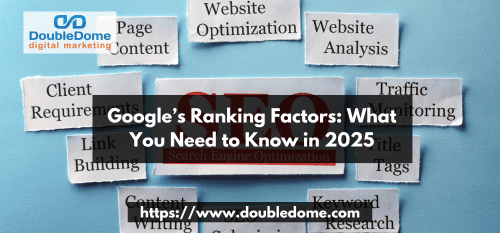By Janice Ramos
Your business’ online visibility can make or break your growth strategy. With Google constantly refining its search algorithms, understanding the key ranking factors is crucial to staying ahead of the competition. For business leaders, who prioritize growth but lack deep SEO expertise, this guide breaks down the most critical ranking factors in 2025 and how you can leverage them to boost your brand’s online presence.

1. AI & Machine Learning Are Shaping Search Results
Google’s algorithms now rely more than ever on artificial intelligence (AI) and machine learning. Google’s RankBrain and the latest AI updates assess search intent, content relevance, and user experience to deliver the best results. What this means for your business:
- Create high-quality, relevant content that directly answers user queries.
- Use natural language and conversational tone to align with AI-driven search.
- Optimize for semantic search by incorporating related keywords and addressing common customer pain points.
2. Content Quality & E-E-A-T (Experience, Expertise, Authority, Trustworthiness)
Content remains king, but Google has doubled down on its E-E-A-T principles:
- Experience: Show firsthand expertise in your content (e.g., case studies, testimonials, real-world examples).
- Expertise: Ensure content is created or reviewed by industry professionals.
- Authority: Build a strong online presence through backlinks from credible sources.
- Trustworthiness: Secure your website with HTTPS, clear contact information, and transparent business practices.
Actionable Tip: Update old content to reflect the latest trends and insights, reinforcing your credibility.
3. Page Experience & Core Web Vitals Matter More Than Ever
Google emphasizes a seamless user experience, ranking sites higher when they load fast and function smoothly. The key Core Web Vitals for 2025:
- Largest Contentful Paint (LCP): Measures page load speed (should be under 2.5 seconds).
- First Input Delay (FID): Gauges site interactivity (should be under 100ms).
- Cumulative Layout Shift (CLS): Evaluates visual stability (should be minimal).
Actionable Tip: Conduct regular site audits using Google’s PageSpeed Insights and fix performance bottlenecks.
4. Mobile-First Indexing is Non-Negotiable
Google now prioritizes mobile-friendly websites, as most users browse on mobile devices. If your site isn’t optimized for mobile:
- You risk lower rankings.
- Users will leave quickly, increasing bounce rates.
- Competitors with mobile-optimized sites will gain an edge.
Actionable Tip: Use Google’s Mobile-Friendly Test tool and implement a responsive design.
5. Voice Search & Conversational Queries Are Growing
With the rise of smart assistants (Siri, Alexa, Google Assistant), more searches are voice-driven. People use longer, conversational queries, so optimizing for voice search is crucial.
- Use natural, question-based keywords (e.g., “What is the best CRM for small businesses?”).
- Optimize for featured snippets, as voice assistants often read them aloud.
- Ensure local SEO is strong to capture “near me” searches.
6. Video Content is a Powerful SEO Asset
Google increasingly ranks video content, especially from platforms like YouTube. Incorporating video into your content strategy can boost engagement and rankings.
- Create short, informative videos answering common customer questions.
- Optimize video titles, descriptions, and transcripts with relevant keywords.
- Embed videos on your website to increase dwell time.
7. Local SEO & Google Business Profile Optimization
For businesses targeting specific regions, local SEO is essential. Google Business Profile (GBP) optimization can directly impact visibility.
- Keep your GBP updated with accurate business details, hours, and services.
- Encourage customer reviews and respond to them promptly.
- Use local keywords in website content and blog posts.
8. Backlinks Still Matter, But Quality Over Quantity
Backlinks (links from other sites to yours) remain a strong ranking signal. However, quality trumps quantity in 2025.
- Focus on earning links from authoritative industry sites.
- Guest post on relevant blogs and contribute to industry discussions.
- Avoid spammy link-building tactics that could lead to penalties.
9. Zero-Click Searches & Featured Snippets Are Changing Click-Through Rates
More searches now end on the search results page itself, thanks to Google’s featured snippets and knowledge panels. While this can reduce organic traffic, you can still benefit by:
- Optimizing content for featured snippets.
- Using structured data (schema markup) to enhance search visibility.
- Focusing on brand awareness and thought leadership.
10. AI-Generated Content & Google’s Perspective
AI-generated content is becoming more common, but Google prioritizes human expertise and unique insights. While AI can help with content creation, it should be used as a tool, not a replacement.
- Review AI-generated content for accuracy and originality.
- Combine AI with human insights to create compelling, trustworthy content.
- Avoid AI spam content, as Google actively penalizes low-quality automation.
Conclusion
For business leaders, SEO success in 2025 requires a balance between technical optimization, high-quality content, and user experience.
Prioritize valuable, engaging content that demonstrates expertise.
Optimize for speed, mobile-friendliness, and voice search.
Leverage video and AI tools while maintaining a human touch.
Strengthen local SEO and credibility through backlinks and social proof.
SEO doesn’t deliver overnight results, but a well-structured strategy will ensure your business maintains a strong digital presence and continues attracting high-value customers.
Need help implementing these strategies? Partner with an experienced digital marketing agency that understands your growth goals. Contact our experts today!








